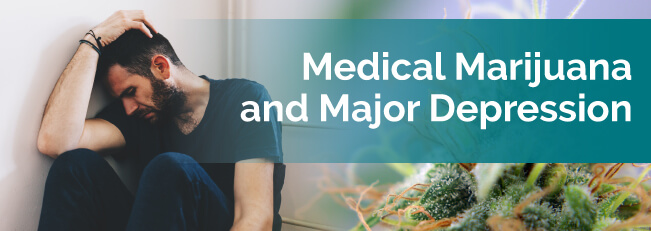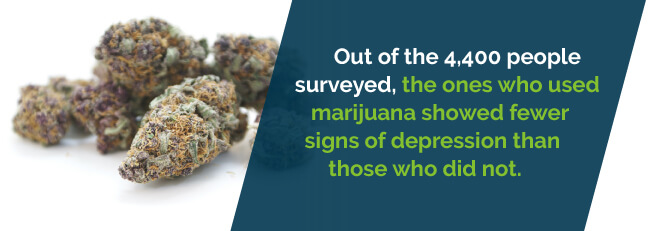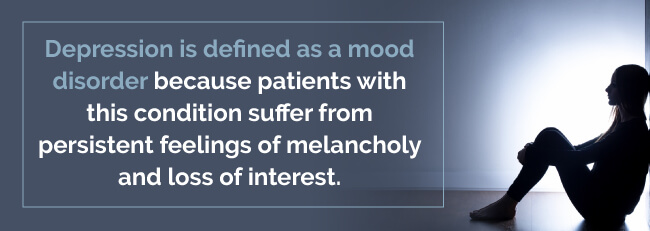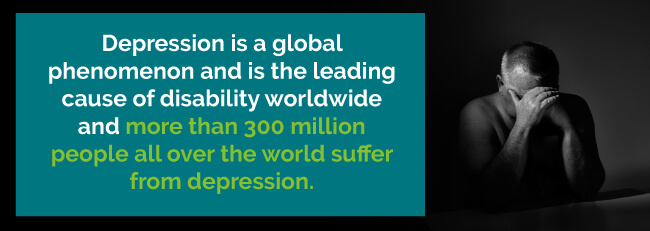
Did you know that one in ten adults in the United States is affected by depression every year? That makes for a total of 18 million sufferers in our country alone, and these are just the ones that have been documented. This says nothing about the sufferers who go undiagnosed and untreated.
With statistics like these, we might almost refer to depression as an epidemic. Depression is so prevalent that even if you yourself have never experienced it, you almost certainly know one or two people who have.
In the face of data like this, there’s one logical question that springs to mind. What can be done to treat this overwhelming number of cases? There are plenty of answers, of course, with therapy and medication being the two most popular choices. But they aren’t the only options available, and today we want to talk about a third option — medical marijuana.
We live in a day and age where those with depression no longer have to hide that they struggle with the disorder. It’s now seen for what it truly is — an illness. Like patients with cancer or AIDs, those living with major depression should not be ostracized, but helped.
Marijuana is often used as a form of self-medicating by those struggling with this disorder. Because of this, many have the misconception that cannabis is a cause of depression. But as we understand the nature of marijuana more and more, we see that it may be in fact be an effective treatment for depression.
If you live under the weight of major depression, don’t use pot to self-medicate. Some states are allowing those with this condition to qualify for a medical marijuana card. This means you can get the cannabis medications you need under the supervision of a qualified physician. Read on to find out how medical marijuana could help you fight depression.
For centuries, people have been using cannabis as a treatment for depression. Its ability to give energy and heighten a user’s mood is well documented. Currently, medical marijuana is used to treat many debilitating conditions, like cancer or HIV. Patients with these illnesses often struggle with depression. Using cannabis helps them cope with depressive feelings.
Medical marijuana research is in its infancy. Many of the studies that have been conducted focus on how cannabis has curative properties for physical disorders. However, not much attention has been given to its treatment of psychological disorders. Now that marijuana is an accepted treatment in many states, researchers are discovering its potential to treat mental illness.
The University of Southern California conducted marijuana and depression research using a survey targeting both marijuana users and people who do not use marijuana. The survey, which used “The Center for Epidemiologic Studies Depression Scale,” showed interesting results. Out of the 4,400 people surveyed, the ones who used marijuana showed fewer signs of depression than those who did not.

Further studies were conducted into whether recreational users were more depressed than medical marijuana users as some have suggested, and this also showed interesting results. Recreational marijuana does not appear to have more risks in causing or worsening depression.
In fact, medical marijuana users were shown to have more signs of depression than recreational marijuana users, which were attributed to their various illnesses. There is no evidence to suggest that medical marijuana was causing depression. Prolonged illness has long been known to be one of the risk factors for depression.
If you are new to the world of weed, it can be tricky to know where to start. With so many different strains out there, it’s a lot to sort through and determine which strains might be best for your specific needs.
Which strains of bud are best for treating depression? That depends what symptoms you’re looking to address:
The cannabinoids in pot react with the endocannabinoid receptors throughout our bodies. Some of these receptors directly impact mood. This means a product of using cannabis is alleviating depression and causing a more positive outlook.
Here are some of the best strains to improve your mood:
One of the few widely accepted uses for medical marijuana is for increasing appetite. Individuals with major depression may experience extreme loss of appetite that can lead to dangerous weight loss.
Medical marijuana can help them eat more after ingestion or smoking. One of its primary uses in this department is for emaciated HIV patients. Nonetheless, it can increase appetite in any individual. In fact, this is one of the most common effects of medical and recreational marijuana.
These are some good strains for handling the loss of appetite:
Other strains known for increasing appetite include Granddaddy Purple and Lemon Kush.
Cannabis, especially Sativa strains, are known for their energetic side effects. For patients struggling to get out of bed, this boost to motivation could be exactly what they need. Also, pinene is a terpene which improves focus.
Some excellent strains for fighting fatigue include:
Cannatonic, Cinex, and XJ-13 are also good strains for boosting energy.
While some patients struggle with malaise, others struggle with insomnia. Racing thoughts make it difficult to relax and get a good night’s sleep. Marijuana, especially Indica strains, brings a sense of peace and lead to a deep slumber.
Some good strains for getting some sleep include:
Other strains that work well for treating insomnia include Tahoe OG Kush, Purple Urkle and Skywalker.
Talk with your marijuana doctor to decide which of these strains might be the best fit for your symptoms.
Not all states allow patients to receive medical marijuana treatments for depression. To find out if you qualify, meet with a marijuana doctor in your state. They can answer any questions you have and help you get the treatment you need.
There are a variety of different ways you can choose to consume your marijuana to treat your symptoms. All of them come with slightly different benefits, which may be the reason you choose one method over another. Additionally, some people may simply prefer one method or dislike another, leading them to choose their consumption method accordingly.
Decide which of the following methods works best for your needs.
Marijuana has very few negative side effects, and they are generally milder than the side effects from traditional medications. Additionally, most of these side effects fade as the drug passes through the body. Everyone reacts to pot differently, but some common side effects include red eyes, short-term memory loss, increased heart rate and slower reaction time.
Also, different strains have different effects and can induce symptoms you are trying to treat such as anxiety, fatigue and insomnia. It’s important to find the strain that works best for you.
It has long been said that marijuana increases or causes depression and other mental health maladies. While it is certain that some react poorly to medical marijuana and should be given other treatments, this is no different from other mental health medications in this way.
Furthermore, the statement that medical marijuana is a cause of mental health maladies like major depression seems to have no basis in truth. Circumstances that lead people to use marijuana and the likelihood of people self-medicating with marijuana is likely leading people to believe this myth.
According to Dr. Daniel K. Hall-Flavin on the Mayo Clinic website, marijuana is probably not the cause of any kind of depression. He states that the same factors that lead individuals into depression are similar to the factors that lead individuals to self-medicate with marijuana. In other words, marijuana does not cause depression.
People using marijuana who are also depressed were either already depressed or predisposed to depression before they began using marijuana. The fact that so many people turn to marijuana to treat their depression says more for the use of marijuana as a medical treatment than it does for marijuana as a cause of depression.

Nonetheless, it is important to note that adverse mental reactions do happen in a small portion of marijuana users. Medical marijuana use under the supervision of a mental health professional is always preferable to self-medication.
To gain a more nuanced understanding of the ways marijuana can be an effective treatment for those suffering from depression, it will be helpful to first deepen our knowledge of depression itself.
Unlike a physical disorder, like glaucoma or Parkinson’s disease, depression is easier to hide. This psychological disorder can be concealed by those who suffer from it. Those around them may have no idea that they are struggling at all. The sufferers themselves may feel miserable or unhappy and have no idea why.

Depression is defined as a mood disorder because patients with this condition suffer from persistent feelings of melancholy and loss of interest. The condition affects many areas of daily life such as how you think, feel or behave. Day-to-day activities become difficult. Depression can even lead to thoughts of suicide, as the patient sometimes feels that life is not worth living
Other names for it include:
Depression is not a weakness. Patients shouldn’t be expected to just to shake it off. Instead, those with depression should pursue treatment. If you’re suffering from depression, a medical professional can help you cope with these feelings. The most important thing is seeking help and being open about your condition.
Many people don’t realize that depression is a nuanced and varied condition. The main types of depression include:
The exact cause of depression is unknown. However, there may be many contributing factors that make certain people more susceptible to the disorder. These include:
Depression can be triggered by a traumatic or stressful event. This includes sources like abuse, divorce, bullying, the death of a loved one, financial difficulties and other outside forces that cause a person to experience feelings of anxiety or sadness.
Researchers have studied the brains of those with depression and have noticed physical changes. Although they’re uncertain about the meaning of this, they hope this could lead to an exact cause and treatment.
The endocannabinoid system plays a significant role in how our body and mind find balance. If cannabinoid receptors or neurotransmitters are not sending signals properly, this could affect a person’s mood stability.
If the hormones in a person’s body are out of whack, this could trigger depression. Hormone imbalances can occur because of thyroid problems, menopause, pregnancy or after delivery (postpartum) or because of other conditions.
If a blood relative has had depression, bipolar, alcoholism or has committed suicide, depression is more likely to occur. Researchers are trying to discover specific genes that may be involved in the cause of this condition.
Other factors appear to increase a person’s risk of developing the disorder. These include:
Depression’s effects are felt worldwide. Did you know:

Because depression affects people so deeply, it can lead to many problems, both emotional and physical. It can change the way you deal with others in your daily life, such as at work or school, and may impact your relationships.
If you have any of the following symptoms for more than two weeks, you may have the condition. There are five categories of depression symptoms:
The symptoms of depression look a little different in everyone. The above symptoms can vary in how severe they are, how frequent and how long they last. Your depression could manifest in a different way than another patient’s.
Although these symptoms may not be life-threatening, other severe complications can arise because of depression. This includes:
It is normal to get the “blues” or have feelings of sadness or depression. Most people can snap out of these feelings after a time. However, if these feelings last for longer than a few days, you may want to consider professional help, especially if these feelings impair your ability to function normally.
To be diagnosed with depression, make an appointment with a medical professional. Specialists equipped to both diagnose and treat depression include:
The key symptoms that medical professionals look for to diagnose depression is a depressed mood and loss of interest in things you once enjoyed which last nearly every day for at least two weeks. These symptoms also need to have caused distress or impairment.
The physician will then determine if your depression may have any other cause. This could include another medical condition or the effects of some substance, like medications or drugs.
To achieve a depression diagnosis, the medical professional will use the following:
The DSM-5 is a manual used to diagnose mental health disorders. If you read through the above symptoms and discover that you have had at least five of them for more than two weeks, you may have depression.
Those struggling with depression should not give up hope. Clinical depression is considered a treatable condition. The most common treatments for depression usually include a combination of medication and therapy.
Medications may be able to relieve the symptoms associated with depression. Patients work with a medical professional to find treatments that work best. This involves trial and error, as each medication produces a different effect depending on the individual.
The use of certain types of mental health medications can also lead to “discontinuation syndrome” if a patient stops using the drug. This can cause patients to get very sick and present with many adverse side effects.
Therapy involves talking over your thoughts and feelings with a mental health professional. Different types of therapy have proven effective for depression. However, this form of treatment is subjective and may work for some but not for others.
If you or one of your loved ones are suffering from depression, don’t wait to get treatment. Choose to seek help today and begin experiencing relief from your symptoms. And while it’s important to seek help — any help — it’s also important to search for help that will work for you. Medications may produce unwanted side effects, and therapy may be useful for some, but not for others. When you choose medical marijuana, however, you can be certain you’re selecting a treatment method that’s effective and has few risks and drawbacks.
To get started with your marijuana treatment, consult with a local marijuana doctor and locate a medical marijuana dispensary near you and start experiencing relief today.
Find A Doctor Find A Dispensary